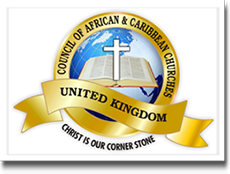The Council of African and Afro-Caribbean Churches UK
The Most Reverend Father Olu Abiola initiated the formation of a Council after it was realised that the African community needed a united body to advance the Christian faith. Under the precept that Unity is strength, the Council of African and Allied Churches was formed in 1979 after previous attempts failed. The membership drew tremendously in the early eighties and also included churches of Caribbean origin. Due to the diversity of membership the name was changed to reflect the membership so the Council changed its name in 1986 to the Council of African and Afro-Caribbean Churches. The Council’s membership is open to all Churches that confess the Lord Jesus as the Son of God and the Saviour of the world.
Evangelism
In order to fulfill our mission on earth that Christ established for his church, the Council takes the responsibility to implement measure to ensure that our members operate as one body in Christ through witnessing and evangelism. The Council supports to our members by having our representatives attend special events and we make efforts to develop our member churches and churches that embrace the African way of worship. The Council will assist in training Ministers, obtaining place of worship and properties as well as mediates on the churches behalf in time of crisis.
Social Justice
The Council has among its priorities to educate its members and the general public on issues of religion, social and political matters. It intervenes on behalf of member on immigration issues and offers support should the Council believe their human rights are being breached. The Council embraces unity and dignity and decries injustice, oppression, racism and apartheid. The Council formulated a declaration against Apartheid which was sent to the South African Embassy and participated in the ‘Carols for South Africa’ outside the Embassy in Christmas 1989.
In 1985, the Council became an associate member of the British Council of Churches and member of the Church Federal Council and Council of European Churches in 1987 and 1990 respectively. Through involvement with the Centre for Black and White Christian Partnership, the Council encourages inter-church relations, mutual trust and build up competent leaders between black and white Christians.
Ecumenism
The Council plays an important role in forming new ecumenical instruments which started an invitation to Aladura International Church in 1985. Father Abiola represented the Council on the Planning Group for Lent 1986 and 1990, was a member of the Steering Group of Inter-Church Process and the Commissioning Group for the Council of Churches for Britain and Ireland. Father Abiola was also one of the six Presidents of the Council of Churches in Britain and Ireland. As a result of the tremendous work of the Council members were able to tackle immigration problems, secure places of worship through purchase, renting or sharing and attain theological training at recognised University.

